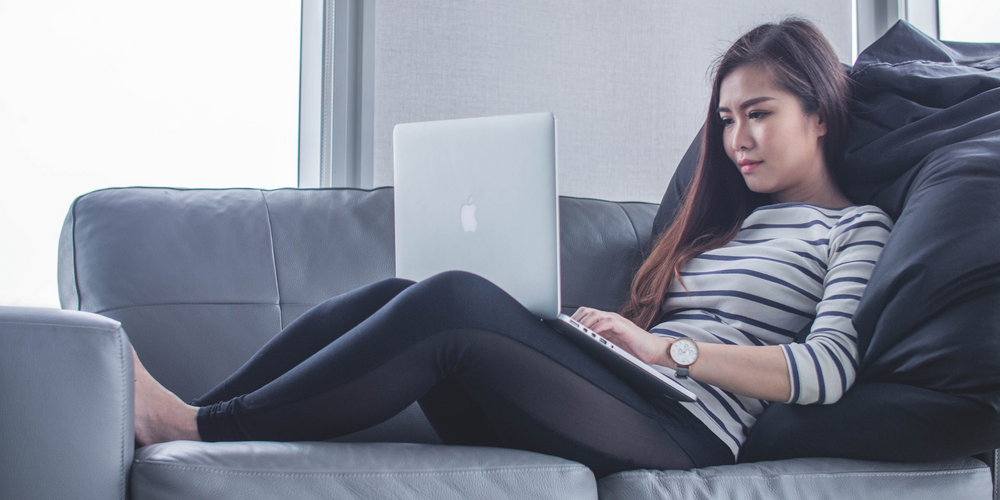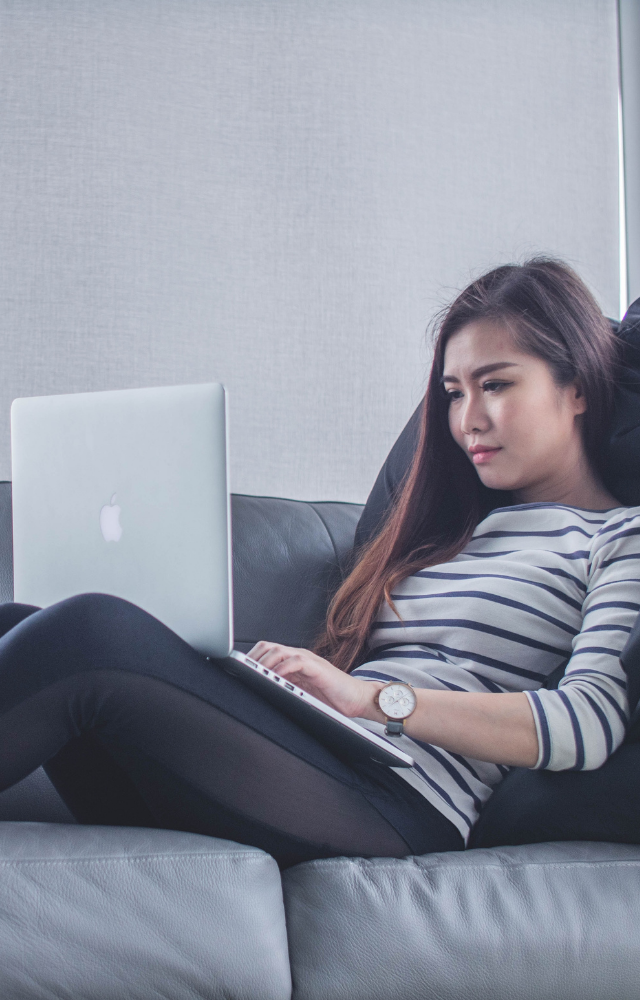Get 20% off 2 or more full priced Baxters or Wellbeing products! Add another full priced item below and a 20% discount will be applied to your overall order at checkout. That's right, 20% OFF your order!
Choose a category


What is screen time doing to your skin?
08.03.22
As screen time increases for both work and play, the amount of blue light we’re exposed to is also rising. So, does blue light damage skin? And what can you do to prevent potential damage?
Take a moment to think about how much time you spend in front of a screen each day. Whether it’s back-to-back Zoom calls, watching Netflix in bed or scrolling endless videos on TikTok, we’re being exposed to more artificial blue light than ever – and it is having a lasting effect on our
skin, eyes and our overall wellbeing.
What is blue light?
To put it simply, blue light is a short, high-energy wavelength in the visible light spectrum. This electromagnetic spectrum is made up of wavelengths of varying lengths, seen as colours by the human eye. Every wavelength is represented by a different colour: violet, indigo, green, yellow, orange, red or blue.
Blue light is the highest frequency visible to the human eye. It is positioned at the top of the light spectrum and is very close to Ultraviolet light – well known for causing damage.
Blue light is natural and can be found everywhere. Sunlight is the main source and the way most people get exposed. The wavelength of blue light is very short, and due to its high
energy, it scatters very easily when it meets air and water. This is why we can thank blue light for the colour of our sky.
Blue light naturally boosts attention, supports your memory, increases your reaction times and lifts your mood. It also helps your body create its natural circadian rhythm, and aids your natural production of melatonin – the hormone that tells your mind and body when it’s time to sleep and wake up.

Does blue light damage skin?
When it comes to minimising premature ageing, photosensitivity and pigmentation, there is growing evidence supporting the fact that protecting your skin from UVA and UVB rays alone simply isn’t enough. Blue light’s relatively short wavelength means it has a higher energy intensity than other lights in the visible spectrum. The significance of this for your skin is
that it is more likely to cause cell damage.
Like its cousins UVA and UVB, blue light has been known for causing oxidative stress – linked to premature ageing. While a day in front of a screen isn’t as bad as a day out in the sun, research suggests that spending five working days in front of a computer has the same impact as 25 minutes in the midday sun without any protection. And most of us wouldn’t think about exposing our skin to those conditions without some protection.
When blue light stresses the skin, it reacts by producing inflammation and producing free radicals. These harm the skin by damaging its make-up through the weakening of collagen and elastin. When collagen and elastin are compromised, skin becomes uneven and lines and wrinkles form.
The effects of UV light on the skin is well known, but there has been more recent research into the effects of blue light on skin over the past decade, particularly related to cell damage and oxidative stress.
Further studies have revealed that longer exposure to high-energy blue light can increase the amount of DNA damage, cell and tissue death, and injury, eye damage, skin barrier damage, and photoaging.
Blue light affects your beauty sleep
Increased use of tech is not only affecting your skin, but your eyes and overall wellbeing too. Because blue light can boost our attention levels and reaction times, influence circadian rhythms, and affect the production of melatonin ‘the sleepy hormone’, increased exposure is also affecting our sleep patterns and stress levels. Eye strain, tension headaches and non-restful sleep are all symptoms of digital stress caused by exposure to artificial blue light. Sleep is so important for overall health, and getting adequate rest is also a key part of your skincare regime.
How to help protect your skin and eyes from artificial blue light
With skincare a major part of many Aussies’ daily self-care regime, it’s important to factor blue light exposure into the equation. We could say just avoid the excessive exposure, but that’s unrealistic for someone who spends their entire workday in front of a screen. Luckily
there are products out there that let you add a simple step to your daily self care routine to protect, hydrate and refresh your skin and help slow down the effects of blue light exposure.
Our own Blue Light Defence Hydration Face Mist includes the scientifically backed ingredient BlueShield®, which has been clinically proven to reduce the effects of blue light damage on the skin. BlueShield® uses carotenoids found in red bell peppers that act as antioxidants to fight blue light on two fronts:
1/ Reduces photo oxidisation – protects the skin’s DNA from free radicals and reduces collagen and elastic degradation, helping with lines and uneven skin tone.
2/ Protects from photoreceptor disruption – by filtering the blue light, the mist helps prevent pigmentation and disruption of circadian rhythms.
All this with a simple spritz – and it’s rich in antioxidants to nourish and hydrate your skin, leaving you feeling fab throughout the day.
For the eyes, try a pair of our Blue Light Glasses. Not only do they look great, but they have our Blue+ ™ technology embedded right into the lens, filtering out as much as 80% of the highest energy wavelengths known to lead to digital eye strain, headaches and disrupted sleep. These glasses also have 100% UVA/UVB protection. With your daily Blue Light Defence Hydration Fce Mist and a pair of Baxter's on – you’ll be looking great and living well.
How to add blue light protection into your daily self-care regime:
Make it part of your every day skincare routine. Spritz on Blue Light Defence Hydration Mist throughout your day if you are exposed to long periods of blue light.
1/ If you’re working in front of a screen all day, invest in a pair of quality blue light glasses.
2/ Try and reduce your screen time if possible. Take a five-minute break between tasks or meetings to go for a walk, do some neck or shoulder stretches or give yourself another refreshing face spritz.
3/ In the evening when the sun goes down you could also try a pair of our amber Blue+™ Sleep glasses, that filter out the 450-500nm blue light wavelengths that impact the release of melatonin.
While it’s inevitable that digital exposure is increasing, it’s still important to be in control and make sure it’s working for you – if you think your screen time is affecting your health and wellbeing, acknowledge it and take steps to bring it back into the positive part of your life.

